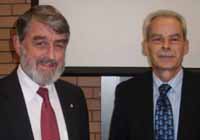 Speaking at Charles Sturt University (CSU) in Bathurst on Tuesday 3 August, the long-serving NSW Director of Public Prosecutions, Mr Nicholas Cowdery AM QC, urged the vigilant preservation of ‘fragile’ human rights over knee-jerk political responses to law and order issues, particularly at election time.
Speaking at Charles Sturt University (CSU) in Bathurst on Tuesday 3 August, the long-serving NSW Director of Public Prosecutions, Mr Nicholas Cowdery AM QC, urged the vigilant preservation of ‘fragile’ human rights over knee-jerk political responses to law and order issues, particularly at election time.The public lecture, titled Human Rights and Law and Order Politics, was hosted by the School of Humanities and Social Sciences in Bathurst and touched on a range of issues including politics and media, bail, sentencing, serious sex and violence offenders, terrorism, bikies and drug laws.
Introducing himself and his topic, Mr Cowdery contextualised his lecture with the observation that he had been interested and engaged in protecting human rights while he was at the Bar and much longer than his nearly 16 years as NSW Director of Public Prosecutions.
“The overall purpose of the criminal law must surely be the protection of the community, and one specific important purpose of the law is to protect the human rights of those who are subject to it,” Mr Cowdery said. “This requires a balancing of apparently conflicting considerations, and indeed, much of the practice of criminal law involves judgment and balance.
“Human rights cannot be and are not ignored in the criminal justice system. For at least the last 60 years prosecutors have been increasingly required to incorporate into the execution of their difficult duties the observance and protection of the human rights of all involved in the criminal justice process and to do that in the application of the just rule of law.”
Mr Cowdery then addressed his concerns about the influence of modern media on politics and thus on ‘law and order’, saying, “It is not overstating the situation to say that on occasions the lawmakers have taken their drafting instructions from the most prominent rantings of the tabloid media. There have been many examples of inappropriate knee-jerk political reaction to bad press or police demands, often ultimately demonstrating the truth of the old adage that ‘bad cases make bad law’.
“Oscar Wilde once observed, long before the advent of electronic mass media, that ‘by giving us the opinions of the uneducated, modern journalism keeps us in touch with the ignorance of the community’. Not only are we now kept in touch with its ignorance, we can be almost overwhelmed by it and forced to see it applied more generally. Talkback radio plays a large part in that. As long ago as 1990 the former Australian Broadcasting Tribunal said, with masterly understatement, ‘Talkback encourages robust debate on issues by people who are not fully informed’.”
Mr Cowdery expressed a concern that changes to bail laws in NSW since 2002 have undermined an accused person’s right to the presumption of innocence. Similarly, he noted that a trend in sentencing towards greater punitiveness, ‘… of more and harsher penalties for criminal conduct and the extension of punishment beyond the sentences imposed by trial judges’, had not resulted in less crime or a safer society.
He also observed that he believed there is no need for the exceptional measures introduced to counter the threat of terrorism to be extended to everyday criminal law enforcement in Australia. He was critical of the new ‘bikie gang laws’, especially for their disregard of the principles of human rights protection that have been reflected in the general criminal law.
In concluding, before he answered questions from the audience, Mr Cowdery drew attention to the recent and on-going debate about a national charter of human rights for Australia.





Social
Explore the world of social